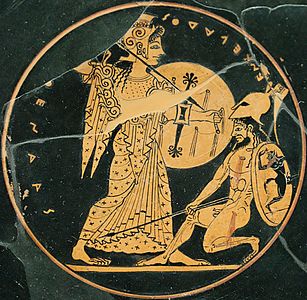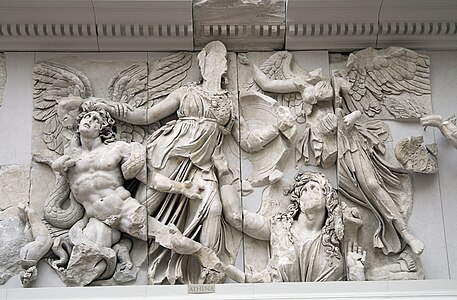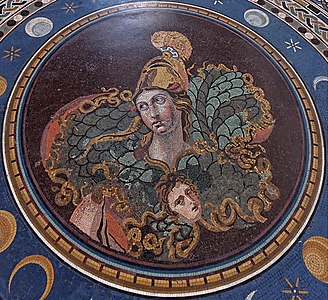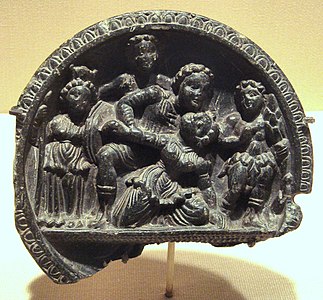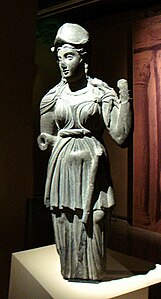Athena

Athena is the Greek goddess of wisdom, warfare, and handicraft. She is one of the Twelve Olympians. Athena's symbol is the owl, the wisest of the birds. She also had a shield called Aegis, which was a gift given to her by Zeus.[1] She is usually shown wearing her helmet and often with her shield. The shield later had Medusa's head on it; after Perseus killed Medusa, he gave the head to Athena for safekeeping, and she put it on her shield.[2]
Athena is the protector of Athens, Greece, a city named after her. The Parthenon, which is on the Acropolis in Athens, is her most famous temple. She also helped many heroes, including Heracles, Jason, and Odysseus, and is always seen with Nike, the goddess of victory.[3]
Birth
There are many stories about Athena's birth. In Hesiod's Theogony, Zeus married Metis, but soon after, Zeus was scared of her giving birth to a child because the Oracle of Delphi had said that she will give birth to Athena, and a son that would overthrow Zeus, just like Zeus overthrew Kronos, who overthrew his father Uranus.[4]
To stop Metis giving birth to her son, Zeus made a plan. He played a game with Metis, they shape shifted into different animals, Metis turned turned into a fly, Zeus saw his chance and he swallowed her whole. Zeus was too late, as Metis was already pregnant.[5]
While she was inside Zeus's head, Metis made a helmet, armor, and a robe for Athena. The hammering noise caused Zeus to have a severe headache. The headache became worse. Hephaestus split his head open, and Athena came out full grown and with armor on.[6]
Titles and patronages
Athena is the goddess of knowledge, purity, arts, crafts, learning, justice and wisdom. She also plays a tough, clever and independent role. Athenians thought she helped them win the Trojan war. Athena often helped heroes, especially ones who were not just brave but clever, like Jason and Perseus.[7] People joined her religon, hoping she would give them victory. She was also the creator of the olive tree and flute.[8]
Attributes and epithets
Athena was given many other titles. She has the epithet Ergane as the patron of craftsmen and artisans. With the epithet Parthenos she was especially worshipped in the festivals of the Panathenaea and Pamboeotia where both militaristic and athletic displays took place. With the epithet Promachos she led in battle.[9] With the epithet Polias, Athena was the protector of not only Athens but also of many other cities, including Argos, Sparta, Gortyn, Lindos, and Larisa.[10]
Gallery
-
Attic black-figure exaleiptron of the birth of Athena from the head of Zeus (c. 570–560 BC) by the C Painter[11]
-
Attic red-figure kylix of Athena Promachos holding a spear and standing beside a Doric column (c. 500-490 BC)
-
Restoration of the polychrome decoration of the Athena statue from the Aphaea temple at Aegina, c. 490 BC (from the exposition "Bunte Götter" by the Munich Glyptothek)
-
Relief of Athena and Nike slaying the Giant Alkyoneus (?) from the Gigantomachy Frieze on the Pergamon Altar (early second century BC)
-
Classical mosaic from a villa at Tusculum, 3rd century AD, now at Museo Pio-Clementino, Vatican
-
Athena portrait by Eukleidas on a tetradrachm from Syracuse, Sicily c. 400 BC
-
Mythological scene with Athena (left) and Herakles (right), on a stone palette of the Greco-Buddhist art of Gandhara, India
-
Atena farnese, Roman copy of a Greek original from Phidias' circle, c. 430 AD, Museo Archeologico, Naples
-
Athena (2nd century BC) in the art of Gandhara, displayed at the Lahore Museum, Pakistan
Family tree
| Athena's family tree | |||||||||||||||||||||||||||||||||||||||||||||||||||||||||||||||||||||||||||||||||||||||||||||||||||||||||||||||||||||||||||||||||||||||||||||||||||||||||||||||||||||||||||||||||||||||||||||||||||||||||||||||||||||||||||||||||||||||||||||||||||||||||||||||||||||||||||||||||||||||||||||||||||||||||||||||||||||||||||||||||||||||||||||||||||||||||||||||||||||||||||||||||||||||||||||||||||||||||||||||||||||||||||||||||||||||||||||||||||||||||||||||||||||||||||||||||||||||||||||||||||||||||||||||||||||||||||||||||||||||||||||||||||||||||||||||||||||||||||||||||||||||||||||||||||||||||||||||||||||||||||||||||||||||||||||||||||||||||||||||||||||||||||||||||||||||||||||||||||||||||||||||||||||||||||||||||||||||||||||||||||||||||||||||||||||||||||||||||||||||||||||||||||||||||||||||||||||||||||||||||||||||||||||||||||||||||||||||||||||||||||||||||||||||||||||||||||||||||||||||||||||||||||||||||||||||||||||||||||||||||||||||||||||||||||||||||||||||||||||||||||||||||||||||||||||||||||||||||||||||
|---|---|---|---|---|---|---|---|---|---|---|---|---|---|---|---|---|---|---|---|---|---|---|---|---|---|---|---|---|---|---|---|---|---|---|---|---|---|---|---|---|---|---|---|---|---|---|---|---|---|---|---|---|---|---|---|---|---|---|---|---|---|---|---|---|---|---|---|---|---|---|---|---|---|---|---|---|---|---|---|---|---|---|---|---|---|---|---|---|---|---|---|---|---|---|---|---|---|---|---|---|---|---|---|---|---|---|---|---|---|---|---|---|---|---|---|---|---|---|---|---|---|---|---|---|---|---|---|---|---|---|---|---|---|---|---|---|---|---|---|---|---|---|---|---|---|---|---|---|---|---|---|---|---|---|---|---|---|---|---|---|---|---|---|---|---|---|---|---|---|---|---|---|---|---|---|---|---|---|---|---|---|---|---|---|---|---|---|---|---|---|---|---|---|---|---|---|---|---|---|---|---|---|---|---|---|---|---|---|---|---|---|---|---|---|---|---|---|---|---|---|---|---|---|---|---|---|---|---|---|---|---|---|---|---|---|---|---|---|---|---|---|---|---|---|---|---|---|---|---|---|---|---|---|---|---|---|---|---|---|---|---|---|---|---|---|---|---|---|---|---|---|---|---|---|---|---|---|---|---|---|---|---|---|---|---|---|---|---|---|---|---|---|---|---|---|---|---|---|---|---|---|---|---|---|---|---|---|---|---|---|---|---|---|---|---|---|---|---|---|---|---|---|---|---|---|---|---|---|---|---|---|---|---|---|---|---|---|---|---|---|---|---|---|---|---|---|---|---|---|---|---|---|---|---|---|---|---|---|---|---|---|---|---|---|---|---|---|---|---|---|---|---|---|---|---|---|---|---|---|---|---|---|---|---|---|---|---|---|---|---|---|---|---|---|---|---|---|---|---|---|---|---|---|---|---|---|---|---|---|---|---|---|---|---|---|---|---|---|---|---|---|---|---|---|---|---|---|---|---|---|---|---|---|---|---|---|---|---|---|---|---|---|---|---|---|---|---|---|---|---|---|---|---|---|---|---|---|---|---|---|---|---|---|---|---|---|---|---|---|---|---|---|---|---|---|---|---|---|---|---|---|---|---|---|---|---|---|---|---|---|---|---|---|---|---|---|---|---|---|---|---|---|---|---|---|---|---|---|---|---|---|---|---|---|---|---|---|---|---|---|---|---|---|---|---|---|---|---|---|---|---|---|---|---|---|---|---|---|---|---|---|---|---|---|---|---|---|---|---|---|---|---|---|---|---|---|---|---|---|---|---|---|---|---|---|---|---|---|---|---|---|---|---|---|---|---|---|---|---|---|---|---|---|---|---|---|---|---|---|---|---|---|---|---|---|---|---|---|---|---|---|---|---|---|---|---|---|---|---|---|---|---|---|---|---|---|---|---|---|---|---|---|---|---|---|---|---|---|---|---|---|---|---|---|---|---|---|---|---|---|---|---|---|---|---|---|---|---|---|---|---|---|---|---|---|---|---|---|---|---|---|---|---|---|---|---|---|---|---|---|---|---|---|---|---|---|---|---|---|---|---|---|---|---|---|---|---|---|---|---|---|---|---|---|---|---|---|---|---|---|---|---|---|---|---|---|---|---|---|---|---|---|---|---|---|---|---|---|---|---|---|---|---|---|---|---|---|---|---|---|---|---|---|---|---|---|---|---|---|---|---|---|---|---|---|---|---|---|---|---|---|---|---|---|---|---|---|---|---|---|---|---|---|---|---|---|---|---|---|---|---|---|---|---|---|---|---|---|---|---|---|---|---|---|---|---|---|---|---|---|---|---|---|---|---|---|---|---|---|---|---|---|---|---|---|---|---|---|---|---|---|---|---|---|---|---|---|---|---|---|---|---|---|---|---|---|---|---|---|---|---|---|---|---|---|---|---|---|---|---|---|---|---|---|---|---|---|---|---|---|---|---|---|---|---|---|---|---|---|---|---|---|---|---|---|---|---|---|---|---|---|---|---|---|---|---|---|---|---|---|---|---|---|---|---|---|---|---|---|---|---|---|---|---|---|---|---|---|---|---|---|---|---|---|---|---|---|---|---|---|---|---|---|---|---|---|---|---|---|---|---|---|---|---|---|---|---|---|---|---|---|---|---|---|---|---|---|---|---|---|---|---|---|---|---|---|---|---|---|---|---|---|---|---|---|---|---|---|---|---|---|---|---|---|---|---|---|---|---|---|---|---|---|---|---|---|---|---|---|---|---|---|---|---|---|---|---|---|---|---|---|---|---|---|---|---|---|---|---|
| |||||||||||||||||||||||||||||||||||||||||||||||||||||||||||||||||||||||||||||||||||||||||||||||||||||||||||||||||||||||||||||||||||||||||||||||||||||||||||||||||||||||||||||||||||||||||||||||||||||||||||||||||||||||||||||||||||||||||||||||||||||||||||||||||||||||||||||||||||||||||||||||||||||||||||||||||||||||||||||||||||||||||||||||||||||||||||||||||||||||||||||||||||||||||||||||||||||||||||||||||||||||||||||||||||||||||||||||||||||||||||||||||||||||||||||||||||||||||||||||||||||||||||||||||||||||||||||||||||||||||||||||||||||||||||||||||||||||||||||||||||||||||||||||||||||||||||||||||||||||||||||||||||||||||||||||||||||||||||||||||||||||||||||||||||||||||||||||||||||||||||||||||||||||||||||||||||||||||||||||||||||||||||||||||||||||||||||||||||||||||||||||||||||||||||||||||||||||||||||||||||||||||||||||||||||||||||||||||||||||||||||||||||||||||||||||||||||||||||||||||||||||||||||||||||||||||||||||||||||||||||||||||||||||||||||||||||||||||||||||||||||||||||||||||||||||||||||||||||||||
Notes
- ↑ According to Homer, Iliad 1.570–579, 14.338, Odyssey 8.312, Hephaestus was apparently the son of Hera and Zeus, see Gantz, p. 74.
- ↑ According to Hesiod, Theogony 927–929, Hephaestus was produced by Hera alone, with no father, see Gantz, p. 74.
- ↑ According to Hesiod, Theogony 183–200, Aphrodite was born from Uranus' severed genitals, see Gantz, pp. 99–100.
- ↑ According to Homer, Aphrodite was the daughter of Zeus (Iliad 3.374, 20.105; Odyssey 8.308, 320) and Dione (Iliad 5.370–71), see Gantz, pp. 99–100.
References
- ↑ Penglase, Charles (2003-10-04). Greek Myths and Mesopotamia: Parallels and Influence in the Homeric Hymns and Hesiod. Routledge. ISBN 978-1-134-72930-2.
- ↑ Jong, Irene J. F. de (2001-11-22). A Narratological Commentary on the Odyssey. Cambridge University Press. ISBN 978-0-521-46478-9.
- ↑ Fritze, Ronald H. (2009-05-15). Invented Knowledge: False History, Fake Science and Pseudo-religions. Reaktion Books. ISBN 978-1-86189-674-2.
- ↑ Pollitt, Jerome Jordan (1972-03-10). Art and Experience in Classical Greece. Cambridge University Press. ISBN 978-0-521-09662-1.
- ↑ Powell, Barry B. (2012). Classical Myth. Pearson. ISBN 978-0-205-17607-6.
- ↑ Ruck, Carl A. P.; Staples, Danny (1994). The World of Classical Myth: Gods and Goddesses, Heroines and Heroes. Carolina Academic Press. ISBN 978-0-89089-575-7.
- ↑ Swiatek, Anthony; Breen, Walter H. (1981). Encyclopedia of United States silver & gold commemorative coins 1892-1954. Internet Archive. New York : Arco Pub./F.C.I. Press. ISBN 978-0-668-04765-4.
- ↑ Hurwit, Jeffrey M. (2000-01-13). The Athenian Acropolis: History, Mythology, and Archaeology from the Neolithic Era to the Present. CUP Archive. ISBN 978-0-521-42834-7.
- ↑ Kerényi, Karl (1974). The gods of the Greeks. Internet Archive. London : Thames and Hudson. ISBN 978-0-500-27048-6.
- ↑ "ATHENA TITLES & EPITHETS - Ancient Greek Religion". www.theoi.com. Retrieved 2024-09-26.
- ↑ 11.0 11.1 Aghion, Barbillon & Lissarrague 1996, p. 193.
- ↑ Palagia & Pollitt 1996, p. 32.
Related pages
Other websites
- Athena -Citizendium

![Attic black-figure exaleiptron of the birth of Athena from the head of Zeus (c. 570–560 BC) by the C Painter[11]](/media/wikipedia/commons/thumb/d/d6/Exaleiptron_birth_Athena_Louvre_CA616_n2.jpg/334px-Exaleiptron_birth_Athena_Louvre_CA616_n2.jpg)
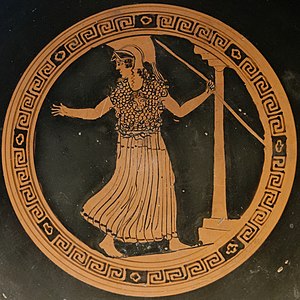
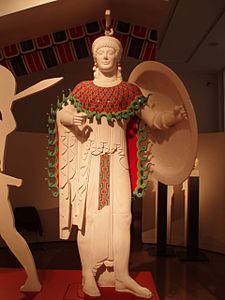
![The Mourning Athena relief (c. 470-460 BC)[12][11]](/media/wikipedia/commons/thumb/1/14/Acropole_Mus%C3%A9e_Ath%C3%A9na_pensante.JPG/225px-Acropole_Mus%C3%A9e_Ath%C3%A9na_pensante.JPG)
